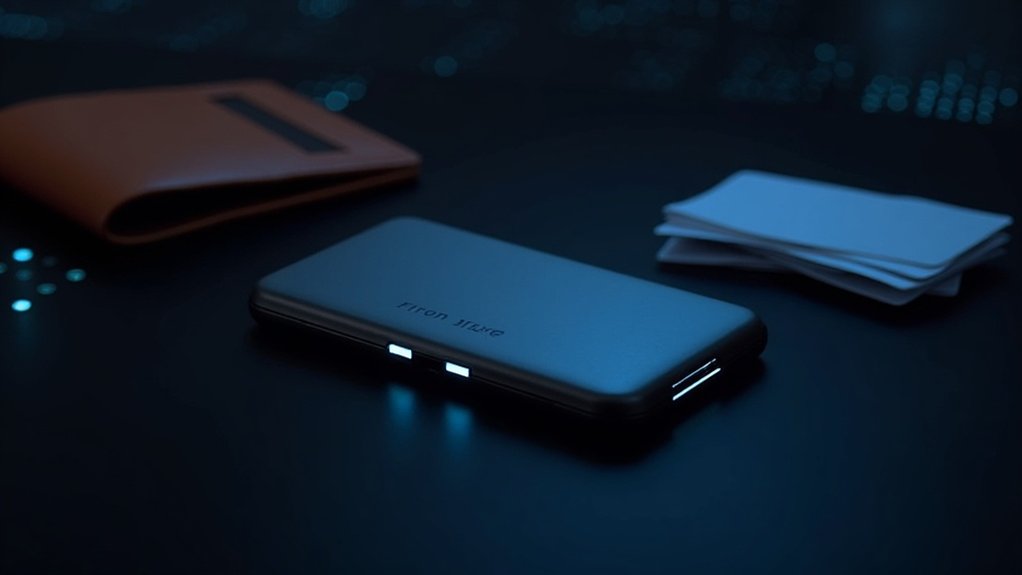Crypto wallets come in several types: hot (online), cold (offline), non-custodial (full control), and hosted (managed by others). Getting started is straightforward. Download a reputable app, create a password, and securely store your recovery phrase—ideally on paper. Hot wallets offer convenience but less security than cold options. Hardware wallets cost between $50-$250 for serious investors. Security matters, so consider combining wallet types for different needs. The details make all the difference.
Wondering where to safely stash those digital coins? Crypto wallets aren’t actual wallets, obviously. They’re digital tools that store the keys to your crypto kingdom.
Not all wallets are created equal. Some connect to the internet (hot wallets), others don’t (cold wallets). Some let you control everything (non-custodial), while others hold your hand through the process (hosted). Your choice depends on what matters most: convenience or security. Usually can’t have both. Sorry. Seed phrases are unique to non-custodial wallets where you maintain complete control.
Getting started with a software wallet is straightforward. Download a reputable app on your phone or computer. Create an account with a password. No need to share your life story—these wallets don’t ask for personal details.
Next comes the essential part: your recovery phrase. It’s typically 12 or 24 random words. Write them down. Seriously. Not in your notes app. On actual paper. This phrase is your lifeline if your device breaks or gets stolen. Lose it, and you can kiss your crypto goodbye.
Your recovery phrase is crypto’s holy grail. Write it down physically or risk losing everything forever.
Prefer having someone else handle the technical stuff? Hosted wallets might be your jam. Think of them as crypto banks. You’ll need to register with personal information and set up strong security measures. Two-factor authentication isn’t optional—it’s essential. These platforms let you buy crypto directly using your bank account or credit card. Convenient, but remember: not your keys, not your coins.
To fund your wallet, you’ll need to acquire some crypto first. Buy it through an exchange or transfer it from another wallet. Verification steps are annoying but necessary. Patience required.
Security concerns keep you up at night? They should. Hot wallets are convenient but vulnerable to hacking. Cold wallets offer better protection but can be lost or damaged. Many crypto enthusiasts use both: cold storage for savings, hot wallets for spending. Like keeping emergency cash in a safe while carrying some in your pocket. Makes sense, right? Hardware wallets typically cost between $50 to $250 and provide the highest level of security for serious investors. Self-custody wallets allow you to engage in advanced crypto activities like yield farming, staking, and lending.
Frequently Asked Questions
What Happens if I Lose My Private Keys?
Losing private keys is a nightmare scenario. No keys, no crypto. Period.
The funds remain permanently locked on the blockchain—an expensive digital paperweight.
There’s no “forgot password” button, no customer service to call.
Cryptocurrency transactions are irreversible, and without those keys, the owner’s digital assets become unreachable.
Major exchanges occasionally make headlines when keys disappear, leaving millions in limbo.
It’s the digital equivalent of dropping gold into the ocean.
Are Crypto Wallets Insured Against Hacks or Theft?
Most crypto wallets aren’t insured against hacks or theft.
Hard truth.
Traditional insurance typically excludes losses from private key mismanagement and direct wallet compromises.
Some custodial exchanges offer limited protection, but it’s nowhere near thorough.
The insurance market for crypto? A measly $1.9 billion compared to the $2.5 trillion crypto market.
DeFi has special insurance products for code vulnerabilities, but they’re niche.
Bottom line: your crypto, your responsibility—mostly.
Can I Transfer Crypto Between Different Types of Wallets?
Yes, crypto can be transferred between different wallet types.
The only requirement? Wallets must support the same cryptocurrency or token standard.
Hardware, desktop, mobile, web—doesn’t matter.
What matters is compatibility.
Each transfer incurs network fees.
Sometimes hefty ones.
Double-check addresses before sending.
Seriously.
Cross-chain transfers aren’t direct, though.
Need special bridges for that.
And not all wallets support every crypto asset.
Verify compatibility first or kiss those funds goodbye.
How Do Wallet Transaction Fees Compare Between Providers?
Wallet transaction fees vary wildly.
Not the wallet’s fault – it’s the blockchain underneath.
Bitcoin Cash is cheap ($0.0024), while Nano costs nothing. Zero.
Hardware wallets like Ledger don’t charge fees themselves, but you’ll still pay network costs.
Coinbase Wallet? They’ll hit you with up to 3.99% for fiat conversions. Ouch.
Some wallets let you customize fees – pay more for speed, less for patience. Your choice, your money.
Can Government Agencies Access My Crypto Wallet Information?
Yes, government agencies can access crypto wallet information under certain conditions.
For custodial wallets, they’ll use subpoenas to force exchanges to hand over data.
Non-custodial wallets? Tougher, but not impossible.
They’ve got blockchain analysis tools that trace transactions.
If they seize devices, they’ll try to extract private keys.
The feds already hold over 200,000 Bitcoin from seizures.
Encrypted wallets without known keys? That’s where their power hits a wall.
For now, anyway.









